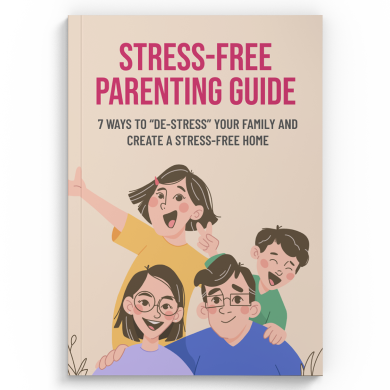In some families, children act like the head of the house. Under this permissive parenting approach, parents revolve around their every whim. It’s like the child is a little pharaoh, while the parents are their dedicated servants, catering to their every need.
These children might even blame their parents for not being good enough if, for example, an eight-year-old doesn’t have the latest smartphone.
Rules are scarce. The main rule is that the child must be happy here and now. If they’re not, parents believe they’ve done something wrong.
Although parents have good intentions and want the best for their child, permissive parenting achieves the opposite effect.
Today, we’ll discuss the indulgent adults, and the alleged “abuse of children” attributed to schools.
Because, as I’ll explain in this article on permissive parenting:
- It hinders a child’s development.
- It is not truly in a child’s best interest.
- It quickly becomes a problem for parents.
- It allows a child to experience everything before they grow up.
- It produces dissatisfied and spoiled adults.
It may sound dramatic, but unfortunately, it’s true.
Let me elaborate.
1. Permissive parenting hinders a child’s development.

To understand where permissive parenting went wrong, let’s delve into the basics of parenting.
Every family should fulfil three fundamental tasks for their child:
- The most basic task is to provide the child with food, protection, safety, emotional support, love, and understanding.
- Support the child’s growth and development in all areas, helping them reach their full potential. It’s not just about physical growth, as some used to believe. Long gone are the days when people said, “Have as many children as you can feed.” It’s not about how much you feed them; it’s about how you nurture them to become well-rounded individuals.
- Integrate the child into society while protecting them from negative social influences. The family should act as a buffer, smoothing out the impact of stressful events.
Permissive parenting typically excels in providing the child’s preferred food and abundant emotional support and love. The problem arises in terms of development. Permissive parents allow the child to develop, but the development only occurs in areas that interest the child, not necessarily in areas where they have the capability to grow.
In today’s modern world, children may not be interested in developing their physical or mental abilities. Instead, they may be more focused on becoming “street smart” and mastering video games or fitting in with their peers. These are NOT beneficial skills for their development if you want to raise smart kids.
2. The permissive approach is often not in the best interest of the child.

Imagine a world where kids are always happy, their every wish granted, and no sweat is ever shed. It might sound idyllic, but it has its pitfalls. In fact, those tough moments, in various aspects of life, help shape extraordinary kids.
But permissive parents prioritise their child’s happiness above all else, ensuring they’re constantly entertained and shielded from any challenging tasks. Sweating during a soccer game is fine because it’s enjoyable. However, sweating while struggling with a language homework assignment, finding it tough to form sentences or write an essay, is unacceptable.
This mindset often leads to blame-shifting, with parents accusing the school of mistreating their child. It’s because the child can sweat in areas they enjoy, but they avoid anything that’s “difficult”.
Imagine a soccer match where parents are cheering from the sidelines. The referee blows the whistle, and the game begins. But there’s one parent who, whenever their child misses a shot, can’t resist the urge to jump onto the field. They take control of the game, attempting to score the goals themselves.
While their intentions may be good, their actions have a detrimental impact on their child’s development. The child never gets the chance to learn from their mistakes, improve their skills, and develop a sense of responsibility. In the long run, their performance suffers, and they struggle to become independent players.
Similarly, in the context of academics, permissive parents who constantly intervene in their child’s school life. Instead of allowing their child to face the challenges and setbacks, they step in and take control. They complete assignments, negotiate with teachers, and shield their child from the natural consequences of their actions.
But here’s the reality check. Just because a child isn’t the fastest runner or hasn’t performed exceptionally well in a fitness test doesn’t mean they won’t succeed in school or in life. It’s crucial to understand that being versatile and adaptable is what truly matters.
However, the permissive approach falls short in preparing children for the real world. Life often presents challenges that aren’t necessarily enjoyable, but require us to excel or at least perform well.
So, let’s take a closer look at the permissive parenting style and why it may not be the best choice for your child’s well-being and success.
3. The permissive approach quickly becomes a problem for parents.

When I talk about the foundations of parenting in my books and courses, I often emphasise the importance of setting boundaries.
I believe it’s best for a child to have clear boundaries that can be adjusted and modified based on their maturity, age, and other factors. However, in permissive parenting, it’s the opposite – everything is allowed until it’s not.
And when parents realise that this approach isn’t yielding the desired results, suddenly children become highly dependent on their daily whims. On one hand, parents can be very permissive and allow everything, but if there are no results, even permissive parents can become unreasonably demanding and sometimes even aggressive.
It quickly becomes a “mixed message”.
Then it’s no longer clear who should always behave like an adult and who is the child. If parents happen to set limits, children don’t adhere to them. And the problem is not that children don’t adhere to the limits, as that is quite normal and expected.
The problem lies in what happens afterward.
Very often, there are no consequences for the violations. Instead of meaningful consequences that could be educational, permissive parents opt for discussions and family meetings. However, only the parents feel like they have accomplished something in these meetings, while children feel nothing has changed.
In fact, they receive an important message.
If they can violate boundaries without any consequences, even though the boundaries were set, it means they weren’t important. So, there’s no need to follow them, right?
This also speaks to the source that sets such boundaries – the parents.
By setting boundaries that hold no consequences, it raises the question; what is the significance of these boundaries? Who’s the fool here?
Children are very perceptive; they are not fools. They realise that parents set boundaries that don’t need to be followed, and as a result, they no longer adhere to any boundaries.
But why should they?
4. Children of permissive parents experience life’s challenges prematurely.

Parents who constantly fulfil their child’s desires today, don’t think about the future.
They cater solely to the child’s wishes, not their actual needs.
By the age of 16 or 17, they’ve experienced it all—criminal acts, sexual encounters, drugs, car thefts, anything that seemed intriguing to them.
What else does life offer them?
Imagine parents who constantly reassure their child, saying, “Don’t worry, these are the best years of your life.” The child, however, starts questioning, “Does that mean there’s nothing better ahead for me?”
Yet, deep down, they already feel a sense of emptiness. Unfortunately, such reassurances only exacerbate their feelings of sadness, leading them into a deeper state of depression.
With no boundaries or rules in place, they will always pursue what pleases them and what they desire, often at the expense of others.
What are the consequences?
Depression, indulgence, the expectation that everything should go their way. They often become antisocial because people who always want things their way are not desired as friends or partners.
They simply can’t handle hearing “NO”.
What about a teenager who feels this way? He’s sixteen years old, 190 cm tall, and weighs 85 kg. He is involved with a girl who weighs 55 kg, and she says “no” to him.
And him? He’s not used to that.
He won’t accept it. Why? Because “no” has always meant “do it anyway”.
So he does it his way and wonders why he’s now facing charges of sexual assault. But, of course, it’s always someone else’s fault that the situation turned out this way.
For instance, I once spoke with a young man in a juvenile detention centre years ago and asked him how he ended up there.
He said it wasn’t his fault; his parents were to blame. What he did, which led him to this point, didn’t seem wrong to him. What was wrong was his parents’ failure to guide him properly.
You may not believe it, but there was some truth to it.
“If my father had sat me down at home, slammed his hand on the table, and said, ‘Enough, kid, if you don’t follow this and that,’ I believe I would have stopped.”
But that didn’t happen, and the young man continued on that path. It didn’t end well for him.
5. Spoiled children become entitled adults.
Spoiled adults who still live with their parents at the age of 45 or 50 become dependent on them, relying on their parents’ pension to support their lifestyle. It’s like a grown-up child who refuses to leave the comfort of their childhood home.
Their ambitions and endeavours often raise eyebrows due to their shady nature. It’s akin to engaging in questionable business practices that can lead to trouble down the line.
When they do find success in these dubious ventures, it is only recognized and celebrated by those involved in similar circles. It’s like being applauded by a group of fellow tricksters.
But outside of their bubble, acceptance and respect are hard to come by. They struggle to earn the admiration of the broader society, as their choices and actions raise doubts and concerns.
These individuals lack the joy of genuine connections and celebrations. While their neighbours gather for joyful picnics and warm birthday wishes, they are left feeling empty, isolated, and detached.
They continue to chase their desires relentlessly, without considering the consequences. It’s like an insatiable appetite that drives them forward, disregarding the potential fallout.
However, when faced with the consequences of their actions, they quickly shift blame and point fingers. It’s as if they are playing a never-ending game of passing responsibility to others.
In rare cases, their choices may seem to work out in their favour. It’s like a roll of the dice that unexpectedly lands on a winning combination. But deep down, the foundations are shaky, and the cracks in their life’s façade are bound to reveal themselves eventually.
We often witness such situations unfold, where individuals prioritise their immediate desires over long-term stability and fulfilment. It serves as a cautionary tale of the potential pitfalls that come with an entitled and self-centred mindset.
However, some manage to see through it all…
If you find yourself resonating with my perspective on permissive parenting, based on my own life experiences, I want to assure you that there is hope.
There are parents out there who have realised the limitations of this approach and have made positive changes for the sake of their children.
I urge you to take a step back and reflect on your parenting style. Consider the long-term consequences of indulgence and the importance of structure and positive discipline in your child’s life. It may not be easy, but it is worth it.
Take action. Be one of those exceptional parents who break free from the permissive trap and embrace a balanced approach to raising your child.
Seek guidance, educate yourself, and make the necessary adjustments to create a healthy and nurturing environment for your family.
I sincerely wish you all the best on this transformative journey,
Warm regards,
Marko Juhant




